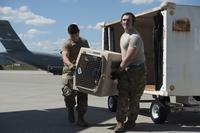For a PCS move, you may be reimbursed for travel and transportation expenses incurred during the allowable travel days en route from the old duty station to the new. However, if the travel lasts a total of 12 hours or less, you may not be eligible for reimbursement of travel expenses.
Reimbursement of en route travel expenses is calculated using the Standard CONUS per diem rate. Current per diem rates are defined in the Joint Travel Regulation (JTR), Volume 2 or Department of State's Foreign Per Diem Rates Home Page.
The per diem rate consists of a lodging allowance, and a meals and incidentals (M&IE) allowance. Reimbursement for lodging may not exceed the actual lodging cost up to the maximum lodging allowance. When lodging is obtained from friends or relatives, reimbursement for the lodging portion is not authorized. M&IE is a fixed amount. The M&IE rate, or a fraction of it, is payable without itemization of expenses or receipts.
During the en route travel, you're in a duty status with no charge to your leave account. However, leave may be used in conjunction with the en route travel when approved by the supervisor and documented on the official travel orders.
Transportation expenses for you and your dependents will also be paid. When travel from the old duty station to the new one is via a privately owned vehicle (POV), a mileage allowance for the use of one POV to the port by the most direct route is authorized. You’re responsible for costs for any indirect route for personal reasons. If commercial transportation is used, the costs of the transportation plus reasonable taxi fares to and between terminals are allowed.
Dependent means the following:
- Children of the employee or the employee's spouse who are unmarried and under the age of 21.
- Children of the employee or the employee's spouse who are unmarried and who, regardless of age, are physically or mentally incapable of self support.
Also included is:
- Any illegitimate child, stepchild or adopted child or any grandchild of the employee or the employee's spouse who satisfies the criteria above.
- Any legal ward who satisfies the criteria above. A legal ward is generally defined as an unmarried person who (1) has been placed in the custody of the employee or the employee's spouse by a court of competent jurisdiction either permanently or for a period which lasts at least 12 months from the date of the order, (2) is dependent upon the employee or the employee's spouse for over one-half of the person's support, and (3) resides with the employee or the employee's spouse.
- Any dependent child who is under a legal guardianship of the employee or the employee's spouse and who also satisfies the criteria above. A guardian is an individual who is given the authority by a court of competent jurisdiction to take care of the person, property, and rights of another person. In this case, the person is a dependent child.
- Any child born after the employee's effective date of transfer when travel of the expectant spouse is prevented at the time of transfer because of the advanced stage of pregnancy or other reasons acceptable to the agency.
Procedures for filing En Route Travel
- To file an En Route travel voucher, submit the following:
- DD Form 1351-2 Travel Voucher or Subvoucher (PDF).
- Provide a detailed itinerary in block 15 showing daily travel, and the cities and states where lodging was obtained.
- Be sure to sign and date. Don’t write below signature block.
- Three copies of Travel Orders including amendments.
- Original and three copies of lodging receipts (claim lodging separately from lodging taxes).
- Copy of advance DD Form 1351, Travel Voucher (PDF).
To get more PCS tips or information, visit Military.com's PCS/Home Buying Guide.













